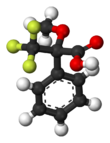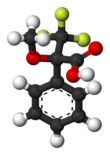Chemistry:Mosher's acid
From HandWiki
Revision as of 00:18, 30 June 2021 by imported>NBrush (fixing)
|
| |||
|
| |||
| Names | |||
|---|---|---|---|
| IUPAC names
(R)-3,3,3-trifluoro-2-
(S)-3,3,3-trifluoro-2- | |||
| Other names
Methoxy(trifluoromethyl)phenylacetic acid, MTPA
| |||
| Identifiers | |||
| |||
3D model (JSmol)
|
|||
| ChemSpider | |||
| EC Number |
| ||
PubChem CID
|
|||
| UNII |
| ||
CompTox Dashboard (EPA)
|
|||
| |||
| |||
| Properties | |||
| C10H9F3O3 | |||
| Molar mass | 234.17 | ||
| Appearance | solid | ||
| Melting point | 46 to 49 °C (115 to 120 °F; 319 to 322 K) | ||
| Boiling point | 105 to 107 °C (221 to 225 °F; 378 to 380 K) at 1 torr | ||
| Hazards | |||
| GHS pictograms | 
| ||
| GHS Signal word | Warning | ||
| H315, H319, H335 | |||
| P261, P264, P271, P280, P302+352, P304+340, P305+351+338, P312, P321, P332+313, P337+313, P362, P403+233, P405, P501 | |||
| Flash point | 110 °C (230 °F; 383 K) | ||
| Related compounds | |||
Related acyl chloride
|
Mosher's acid chloride | ||
Except where otherwise noted, data are given for materials in their standard state (at 25 °C [77 °F], 100 kPa). | |||
| Infobox references | |||
Mosher's acid, or α-methoxy-α-trifluoromethylphenylacetic acid (MTPA) is a carboxylic acid which was first used by Harry Stone Mosher as a chiral derivatizing agent.[1][2][3][4] It is a chiral molecule, consisting of R and S enantiomers.
Applications
As a chiral derivatizing agent, it reacts with an alcohol or amine[5] of unknown stereochemistry to form an ester or amide. The absolute configuration of the ester or amide is then determined by proton and/or 19F NMR spectroscopy.
Mosher's acid chloride, the acid chloride form, is sometimes used because it has better reactivity.[6]
See also
References
- ↑ J. A. Dale; D. L. Dull; H. S. Mosher (1969). "α-Methoxy-α-trifluoromethylphenylacetic acid, a versatile reagent for the determination of enantiomeric composition of alcohols and amines". Journal of Organic Chemistry 34 (9): 2543–2549. doi:10.1021/jo01261a013.
- ↑ J. A. Dale; H. S. Mosher (1973). "Nuclear magnetic resonance enantiomer regents. Configurational correlations via nuclear magnetic resonance chemical shifts of diastereomeric mandelate, O-methylmandelate, and α-methoxy-α-trifluoromethylphenylacetate (MTPA) esters". Journal of the American Chemical Society 95 (2): 512–519. doi:10.1021/ja00783a034.
- ↑ Y. Goldberg; H. Alper (1992). "A new and simple synthesis of Mosher's acid". Journal of Organic Chemistry 57 (13): 3731–3732. doi:10.1021/jo00039a043.
- ↑ D. L. Dull; H. S. Mosher (1967). "Aberrant rotatory dispersion curves of α-hydroxy- and α-methoxy-α-trifluoromethylphenylacetic acids". Journal of the American Chemical Society 89 (16): 4230. doi:10.1021/ja00992a053.
- ↑ See for example: Mosher Amides: Determining the Absolute Stereochemistry of Optically-Active Amines Allen, Damian A.; Tomaso, Anthony E., Jr.; Priest, Owen P.; Hindson, David F.; Hurlburt, Jamie L. J. Chem. Educ. 2008, 85, 698. Abstract
- ↑ D. E. Ward; C. K. Rhee (1991). "A simple method for the microscale preparation of Mosher's acid chloride". Tetrahedron Letters 32 (49): 7165–7166. doi:10.1016/0040-4039(91)80466-J.
 |





